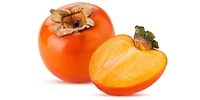Nature's winter gift: 7 great benefits of eating persimmons

Sweet, aromatic and very, very tasty. We meet her on the stands in stores and in the markets every winter. Did you remember who she is? Yes, the paradise apple. There are more than two thousand varieties of it in nature, but only a few of them are invariably loved and sought after by people. It is not by chance that persimmons are called "the food of the gods", "the apple of the heart", "the apple of longevity". It is not only an incredibly delicious dessert, but also a storehouse of useful vitamins and minerals, which have earned the respect of practitioners of traditional medicine thousands of years ago. Just two persimmons a day are enough for a positive attitude and joyful attitude towards life.
Among the most famous varieties are the "Chinese" - the fruits have a round, slightly elongated shape. There is a small depression in the middle of the fruit. The "bee honey" variety, as the name suggests, the taste of this persimmon has hints of honey. It is very juicy and sweet and has no seeds. "Buffalo Heart" is another type. Gardeners know the tomato variety by this name. The appearance of ripe persimmons is very similar to them. They are sweet, soft and very tasty, but difficult to store and transport. The fruit of the 'kings' variety has bright orange skin and brown 'chocolate' flesh. By the way, the darker it is, the sweeter the fruit.
How to choose the best persimmon?
When choosing a persimmon, you should first of all pay attention to the color of the fruit, as well as the leaves and stem. The persimmon should be soft and shiny, with a rich color. If there are dark spots on the skin, then it is overripe! The leaves and stem of the fruit should be dark in color and dry. The aroma of the selected fruits should be light and pleasant, without acidity. Persimmon benefits are 'magical' According to Dr. Shela Gorinstein, a researcher in the Department of Medicinal Chemistry at the Hebrew University of Jerusalem in Israel, one persimmon a day may be healthier than one regular apple. According to the results of her scientific study, persimmons provide more benefits in preventing the risk of cardiovascular diseases in humans. And heart disease is the number 1 cause of death in the world. However, the possibilities of the paradise apple should not be limited to this!
It reduces the levels of "bad" cholesterol
One of the reasons why the persimmon is so beneficial to human health is its nutritional composition. According to scientists, one whole fruit contains 2733 IU of vitamin A, which is more than half of the recommended daily intake. 12.6 mg of vitamin C, which is more than 20% of the daily need for antioxidants. And in smaller amounts, the persimmon contains vitamins E and K, and from the B group. All of them, as well as tannins and fiber, are very effective in the treatment of high cholesterol.
Improves eye health
In addition to vitamin A, which was mentioned above, persimmon is a valuable source of two more substances on which the visual acuity and health of the human eye depends. These are lutein and zeaxanthin. They are contained in the greatest quantities in the skin of the fruit, so the persimmon must be eaten whole. A study of more than 100,000 people found that people whose diet was rich in these substances had a 40% lower risk of developing age-related macular degeneration. This is a common cause of reduced visual acuity in adulthood.
It has a positive effect on digestion
One persimmon fruit contains almost a quarter of the human body's daily fiber needs. This stimulates the digestive tract and helps the body rid itself of toxins, taking care of gut health. Researchers have also found that fiber-rich foods improve the population of "good" bacteria in the gut. Thus, eating persimmons can help increase the amount of probiotics in your body, which are essential for good digestion.
Enriches the body with calcium
The health of teeth, bones and nails largely depends on the calcium content in the body. If there is not enough calcium, the body is forced to "take" this mineral from the bone mass, and this is one of the reasons for the development of osteoporosis. 100 grams of persimmon contains about 127 mg of calcium, which is equal to 11% of the daily norm. Pediatricians do NOT recommend giving persimmon to children under the age of three.
Protects against endocrine disorders
Iodine is necessary for the normal functioning of the endocrine system, and in particular of the thyroid gland. One persimmon contains about 30 mcg of this valuable substance. It is known that a person needs 2-2.5 mcg of iodine per day for every kilogram of his body. Part of the daily requirement can be obtained from persimmons.
It helps to strengthen the immune system
The Journal of Food Quality found that non-astringent persimmons contain more vitamins A and C than their astringent counterparts.


